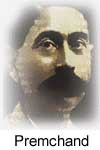

 |  |

The Hindi language comprise of a number of dialects of which those used for literary composition are Khariboli, Rajasthani, Maithli, Brijbhasha and Awadhi. The early period of Hindi literature which is called Adikala is accepted as the period upto mid-14th century. The maingroup of trend setters in this period were: The second period which consists of the mid-14th to mid-17th century is dominated by devotional poetry (Bhakti Kavyas). The Hindi bhakti poetry's consists of two streams : 1)Nirguna, the poets who believed in a formless God or abstract name and 2)Saguna, the poets who believed in singing about a God with attributes. Kabir (1398-1518) is the most important poet in the Nirguna school. He preached the universal religion of man above and beyond Hindu and Muslim orthodoxy and composed a large number of songs and poems. Guru Nanak (1469-1538), the founder of Sikhism is also accepted as an outstanding poet of this school. The Saguna stream is related to Vaishnava poets who belong to the two categories, those worshipping Krishna and those worshipping Rama. Surdas whose poems have been compiled under the title Sursagara was a great poet of Krishna poetry. Vidyapati was also a versatile composer of Hindi poems. The great champion of Rama poetry is Tulasidas (1543-1623) whose Ramacharitamanasa is considered as an important classic by all Hindi lovers. He has command over all the important styles of composition - narrative, epic, lyrical and dialectic. He has given a human character to Rama, potraying him as an ideal son, husband, brother, king and so on. The third period is spoken as the Ritikavyakal. It is also referred to as the Ritismgara Kavya. Riti refers to a special form in which the erotic element is preponderant. Hindi is very rich in both these categories of poetry. During this period Hindi had also a good collection of devotional and historic poetry. In the Bhakti period there were many epics and long narrative poems composed in the dialects of Hindi. Continue.... |
Copyright ©2000 indiansaga.info. All rights reserved.
By using this service, you accept that you won't copy or use the data given in this website for any commercial purpose.
The material on indiansaga.info is for informational & educational purpose only.
This site is best viewed at 800 X 600 picture resolution.